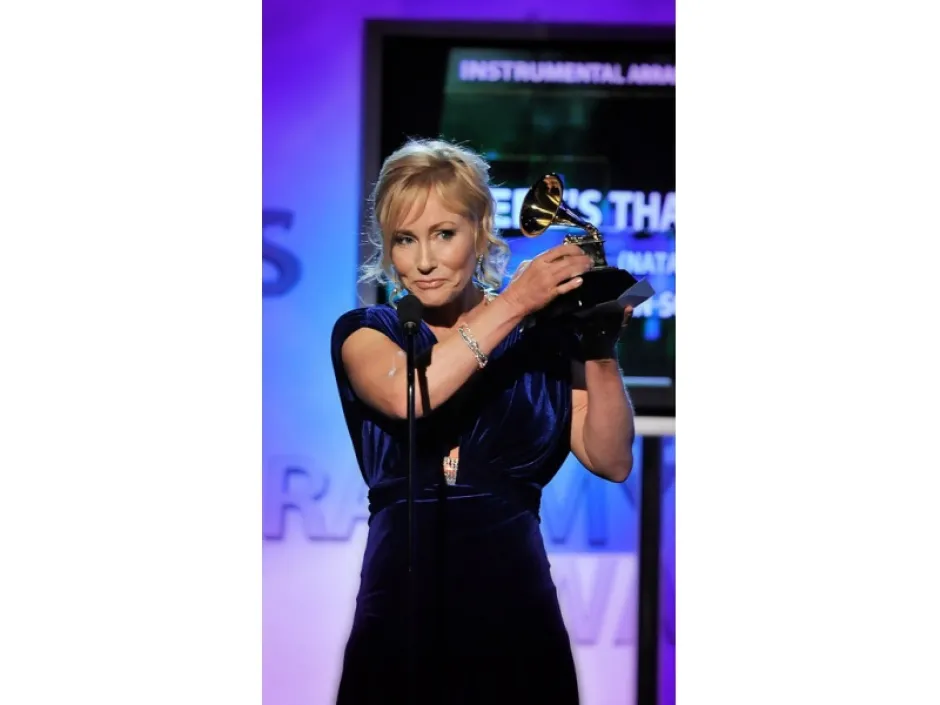Nan Schwartz is a pioneer of women composers in Hollywood. She is a Grammy Award winner and 5 times nominee, and also 7 times Emmy Award nominee. She has worked on many films as composer and arranger – “Godzilla,” “Harry Potter and the Deathly Hollows, Part I”, “Argo”, “The Life of Pi”, ”Julie and Julia, “My One and Only,” “Benjamin Button,” ”Uptown Girls,” ”Freedom Writers,” “Bobby,” and “Lions for Lambs,” among others; she has arranged pieces for some of the finest jazz musicians, and is also a renowned classical music composer.
“I made a full circle,” she smiles when we ask her about choosing music as her profession. Her parents were in music – her dad was a studio musician, and her mother was a studio singer. Intimidated by their success, she went into television production. Then fate stepped in to lead her to the path she successfully threads – she broke her leg in a skiing accident and had to stay in bed for 9 months. Bored with reading and crafting, she started writing vocal arrangements. Soon a friend of hers suggested writing scripts. “Well, I don’t have any stories to tell,” she had said. Having been confronted with the question: “What is your dream?” – she had answered: “To be a film composer like Johnny Mandel.” But stopped herself, thinking it was too late – she had already gone to college and no women were doing this. “Why don’t you study privately and why don’t you become the first woman?”, her friend suggested. “And so I did!” – smiles Nan as she finishes this story.
Nan‘s mother Peggy Clark Schwartz had been part of The Clark Sisters band with her three sisters – they started in a small town in North Dakota and went on to become the vocal band with the Tommy Dorsey Orchestra (who named them The Sentimentalists) and after that they moved on. She was the only one of the four to continue on with her own career as a studio singer, taking part in recordings of Frank Sinatra, Dean Martin, Judy Garland, Henry Mancini, Sonny and Cher… Her father – clarinetist and alto saxophonist Willie Schwartz – rose to fame as a member of the Glenn Miller Band, and then was studio musician for recordings by Ella Fitzgerald, Frank Sinatra and Dean Martin, playing in the Nelson Riddle Orchestra. For Nan Schwartz music is her life, just as it had been for her parents. What had affected her in developing her musical expression was being surrounded by some great music at home, singing with Michel Legrand at an early age, and the bossa nova wave that came about at a time when she was fond of guitar-playing.
Wishing the listeners beauty and love with her music, Nan Schwartz says about her art: “It comes down to the fact that I write what I want to hear.” She is famous for her work as film composer and arranger, composer of classical music and arranger for jazz vocalists and instrumentalists. And each of them is special, she explains: “Film music is much more ambient nowadays. Some of the people I have worked with, when they hear a jazz score, they run screaming out of the room. In my arrangements, fortunately, the people I have worked for want me to express myself, and I haven’t been very restricted. I’ve written some symphonic pieces – I try to make them so that they are expansive and utilize the form of classical music, and yet I want to bring my harmonic sensibilities into it. So, you’re always going to hear some of my jazz harmonies in whatever I write. As for jazz, it depends on the artists and what they are looking for.” Talking about “now” and “then”, for classical music Nan says she responds to melody and to harmony, unlike most of her contemporaries very much like the greats from the past. Hollywood has also changed – competition is tight with “mouse composers”; the male domination, however, is still a fact.
Nan Schwartz’s arranging credits for jazz artists include work with Natalie Cole, Ray Charles, Eddie Daniels, Mark Murphy, Kevin Mahogany, Thomas Quastoff, Till Brönner… Her Grammy Award win for the arrangement of Natalie Cole’s song Here’s that Rainy Day is also an example of her husband’s – Conrad Pope, support: “I was assigned to do three arrangements and I had finished the first two – the last one was Here’s That Rainy Day, which was the most challenging. When I had gotten to a certain point, I played him what I had done, and he said: “I think you can dig a little deeper.” Which meant: “Go back to your room and work a little harder on this.” For that I am grateful, because I won a Grammy for going back to my room to work harder.” As a member of the Recording Academy now, Nan Schwartz outlines as first and foremost listening to the submissions, unlike colleagues who may never hear all the materials but vote for their friends or people they know. And in times when the traditional record stores are no longer here to present the new music released, she looks forward to the voting process as an opportunity to find great new music.
While in Bulgaria, Nan Schwartz has discovered the beautiful playing of the musicians from the Classic FM Orchestra – Conrad Pope will be conducting them in presenting some of the greatest Hollywood music. The Hollywood Comes to Sofia concert is part of The Music of America cycle, presented by Cantus Firmus and the America for Bulgaria foundation.
- For more on this, and many other interesting stories that Nan Schwartz has to tell, press the Audio button and listen to the interview by Jazz FM’s Tanya Ivanova and Svetoslav Nikolov.
Photo credit: http://www.nanschwartz.com/




 Pop out player
Pop out player
















